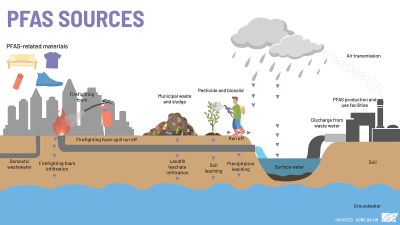The Main Types of Water Filters: A Guide for Homeowners

Almost nothing contributes to our quality of life as much as having reliable access to clean water. Maybe that is why the market for water purifiers around the globe is as large as it is. In 2021, the global water purifier market will be worth about $22 billion!
On top of that, when you combine the different types of water filters out there, the market is growing by more than 7% each year! However, the size of this enormous market hints at how many different types of water filters there are to choose from.
If you are getting your first home water filtration system, how are you supposed to know which kind of water filter to choose? Read on to learn all about the most important things to understand about the different types of water filters and which one might be the best choice for you!
What Kind of Water Filter Is Best?
One of the most important things to understand about water filters is that there is no one best option. Every option on the market exists because there is a reason for it. Each type of water filter provides certain advantages and each comes with its own set of certain disadvantages.
As you read through the options in this article, think about what kind of advantages mean the most to you. It is also important to keep in mind which disadvantages do not bother you too much.
For example, some people will be more than happy to pay however much money it takes to enjoy clean water. A higher price may not be much of a disadvantage to them.
Other people may decide that a system that does not provide balanced pH levels is fine for their needs. In other cases, some people do not need a system to filter out the minerals in hard water. That will make a lot of sense if you are in an area that does not have to deal with hard water.
So, let's look at the first type of home water filtration system you might consider.
Consider the Best Water Filters With Activated Carbon
Activated carbon water filters are popular choices for house filtration systems. Using activated carbon allows them to remove many of the most damaging contaminants that water sometimes carries.
On top of that, many people are happy about how activated carbon systems clean water. At the end of the day, activated carbon is a natural substance that comes from wood or another natural material.
Among other things, activated carbon water filters can eliminate chloramine and chlorine in the water. That will help improve the smell and taste of your water.
How do activated carbon systems provide these benefits? Activated carbon has a natural tendency to absorb certain kinds of contaminants. When the water in your home contacts the activated carbon in your water filter, it will absorb the contaminants while allowing clean water to pass through.
On the other hand, you should keep in mind that activated carbon can only absorb so much. That means that you may need to replace the carbon in your water filter every so often.
For some people, this low level of maintenance is no big deal. For others, it can convince them to look for other options.
The other thing to keep in mind is that activated carbon systems may not be the right choice if you are trying to remove heavy metals from your water. Heavy metals can be extremely unhealthy to ingest, but activated carbon has no effect on them.
Using Sediment Water Filter Options
Sediment filters are used to remove sediment from water. They use carbon as well as other materials and techniques to keep undesirable minerals and particles out of your water.
Many people use these systems because they get their water from a well. They are a great choice for anyone who is dealing with water that contains an unusually high amount of sediment.
Sediment filters use a fine filter to trap large particles. The finer the filter, the smaller the particles that can be caught.
That means that if you decide to go with a sediment filter, you should pay attention to how fine the filter inside is. If you only need to remove the largest particles, you may not need an especially fine filter in your sediment filtration system. But if you want to remove as many sediment particles as possible, you will need a very fine trap to capture them.
As with activated carbon systems, you will need to replace your filter at some frequency. That is because the contaminants removed from your water will sit in your water filtration system. Over time, they will start to keep water from flowing through your system.
If you start to have problems with water pressure, that will be an indicator that you need to change your sediment filter.
On the other hand, sediment filters are affordable. They are also easy to install, which means installation costs will also be low.
KDF Home Water Filters
KDF is an acronym that stands for kinetic degradation flexion. This kind of water filter is built with special granules made out of an alloy of copper and zinc. It is a specialized type of water filter, so it is a good choice for certain situations, but not a great choice unless you deal with the specific problems it is designed for.
The amazing thing about KDF filters is that they actually transform contaminants into harmless alternatives. If you are suffering from heavy metals in your water, a KDF filter might be the right solution for you.
KDF filters can also take care of chlorine and iron in your water. Some people use KDF filters along with activated carbon systems to take care of multiple problems with their water at the same time. If you already have a home water filter and it is not doing what you were hoping it would, you might consider adding a KDF system on top of it.
In many cases, that will be much more affordable than buying a new water filtration system. However, this will not solve your problem if you need to remove sediment or manage certain other problems. Make sure that a KDF system is right for the specific problems you are dealing with before you buy one.
Filter Water With Catalytic Activated Carbon
You can think of catalytic activated carbon systems as cousins of the more traditional activated carbon water filtration systems. They provide similar benefits but are better for certain specific things.
If your water contains more chloramine than chlorine, then you might want to get a catalytic activated carbon filter. On the other hand, if your water has both chloramine and chlorine in it, it is probably better to stick with a traditional activated carbon system.
That goes double because catalytic activated carbon systems tend to cost more than traditional alternatives. They are only better for certain specific problems, so you would not want to spend money on one unless you confirm that you specifically need to target excess levels of chloramine or hydrogen sulfide in your water.
Try Water Filters Based on Air Injection
On the other hand, you may be dealing with excess sulfur or manganese in your water. In that case, neither kind of activated carbon water filter will be the right choice. Instead, you might consider an air injection water filter.
One of the great things about this kind of water filter is that it does not require much maintenance. In a certain sense, it is similar to KDF water filters. Instead of removing contaminants, it transforms them into harmless forms.
Air injection can oxidize the contaminants in your water, chemically transforming them so that they do not cause you any harm. Of course, even once these contaminants are harmless, air injection water filters will remove most of the harmless byproducts.
An air injection system may not be the right choice if your water is expensive. Your water bills may go up a little because air injection systems consume water while they purify it. However, air injection systems need almost no maintenance.
Consider Ultraviolet Water Purifiers
Many people are familiar with how ultraviolet light can kill certain bacteria. That does not make UV water filter systems good for managing contaminants like sulfur or iron. However, if there are microorganisms in your water, almost no water filter will work as well as a UV system to eliminate them.
Of course, some people have both microorganisms and other kinds of contaminants. In such cases, you may need to combine a UV water purifier with some other kind of system.
At the same time, the UV part of your system will require almost no maintenance. At most, you may have to change the lamp in your system every year or so.
Understand the Different Types of Water Filters for Homeowners
The more that you know about different types of water filters, the better the chance you will be satisfied with your decision. Many people choose a random option because they do not understand how different water filters are from each other.
To learn more about different water filters and which might be the right choice for your unique situation, reach out and get in touch with us here!















